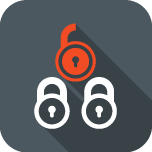Most people don’t think too much about getting hacked during their day-to-day web surfing — until it actually happens. Consequences can range from minor, but annoying, personal computer infections that randomly pop ads up on the screen every few minutes, to much more serious afflictions such as identity theft and financial losses.
1) Make a habit of lying about yourself
 One thing that can stop identity theft in its tracks is giving the attackers the wrong identity. Modern consumers have been programmed by big corporations and government to almost reflexively hand over exactly the sort of information about themselves that identity thieves crave. A simple form asking for name, address and phone number is likely to be filled in without a second thought.
One thing that can stop identity theft in its tracks is giving the attackers the wrong identity. Modern consumers have been programmed by big corporations and government to almost reflexively hand over exactly the sort of information about themselves that identity thieves crave. A simple form asking for name, address and phone number is likely to be filled in without a second thought.
But a second thought would be healthy to have at that point, because that very simple, basic information is the first step on the road to losing control of your credit accounts and other important and private information to hackers.
Many websites refuse to let you proceed without forking over email, name or phone number, but unless there is some important, beneficial reason for you to provide them with that personal information, don’t. In most cases, it may be a legitimate business. In others, you may be saving yourself from a hacking.
2) Guard your email account password like gold
 People use their email so regularly and seamlessly that they come to forget how important it is. Increasingly, our email addresses are the keys to our accounts across the Web. If attackers gain your email account password, they can use their access to the account to reset passwords on almost any of your other accounts. They can also use your conversation history against you, uncovering where you do business, and possibly hints about your other passwords from personal details.
People use their email so regularly and seamlessly that they come to forget how important it is. Increasingly, our email addresses are the keys to our accounts across the Web. If attackers gain your email account password, they can use their access to the account to reset passwords on almost any of your other accounts. They can also use your conversation history against you, uncovering where you do business, and possibly hints about your other passwords from personal details.
Conversely, if you can retain the sanctity of your email account, it can act as a bulwark against other unauthorized access, since you can reset your other accounts.
Related article:How to Set a Secure Password?
3) Don’t use your “real” email for anything public
 A first line of defense against having your email account hacked is to prevent people from knowing what it is. Attackers can then email viruses directly to you or use other means (so-called “spearphishing” attacks to entice you to click on links to infected websites) to attempt a compromise.
A first line of defense against having your email account hacked is to prevent people from knowing what it is. Attackers can then email viruses directly to you or use other means (so-called “spearphishing” attacks to entice you to click on links to infected websites) to attempt a compromise.
But many services are now available to mask your actual email when corresponding with anyone you don’t know. This puts a cut-out between you which can both scan incoming messages for possibly harmful content, and also masks your email provider and address, so direct attacks cannot be made on the server.
4) Drink from the well when you install software
 Many websites or files will require special programs to view properly and, increasingly, they will prompt you automatically to install these programs when you need them.
Many websites or files will require special programs to view properly and, increasingly, they will prompt you automatically to install these programs when you need them.
Don’t be fooled. This is another path by which nefarious actors can bypass security safeguards and convince you to subvert your own computer. What they say they are installing isn’t always what actually gets installed.
Instead of taking their word for it when you see an install prompt, go directly to the website of the program vendor and download the software and install from a secure source. You can be sure that it isn’t loaded with unwanted extras; use the “https” prefix in the URL to ensure the connection is secure (this is increasingly the default at reputable sites these days) for the download, and that your computer will warn you if the security certificate is invalid.
5) Block ads
 Ads aren’t just annoying on the Internet today, they’re dangerous and deceptive. Many are crafted to look like official prompts from your operating system or web browser. Some lead to questionable programs, or themselves contain infected software. Others install tracking cookies that have nothing to do with the website you are visiting, all without your consent.
Ads aren’t just annoying on the Internet today, they’re dangerous and deceptive. Many are crafted to look like official prompts from your operating system or web browser. Some lead to questionable programs, or themselves contain infected software. Others install tracking cookies that have nothing to do with the website you are visiting, all without your consent.
Installing a good ad-blocker to your web browser will help protected you — and prevent annoying pop-ups in your browsing experience!
